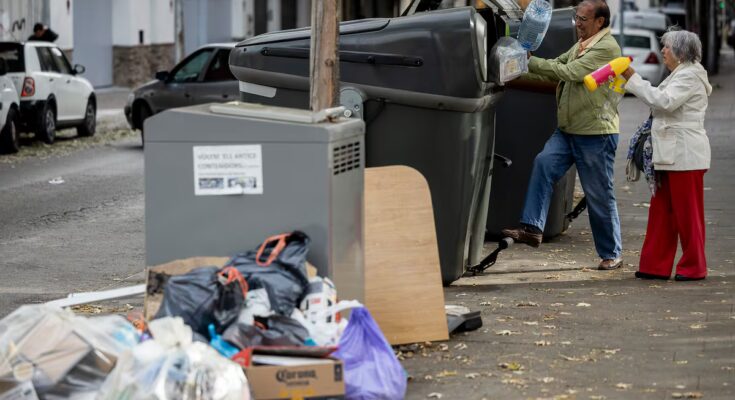The new waste collection and management tariff approved this year by Spanish municipalities shows an unequal map to extremes that are difficult to justify, with differences in taxpayers’ bills reaching 230 euros between some provincial capitals and others. While in Valencia the rate for a typical family is 287.5 euros per year, in Toledo it drops to 56.9 euros, a gap that illustrates the confusion generated by the new tax. The figures are taken from Observatory on waste taxation of the ENT Foundation, a body that the National Association of Local Public Finance Inspectors considers to be an authoritative interlocutor on the subject.
The inspectors describe this scenario of disparity as a real senselessness, the result of poor, hasty and technically deficient regulation which has relegated the task of drawing up the ordinances to the Municipalities, but without clear criteria. The Spanish Government, with an ordinance published in Official State Gazette In 2022, it delegated the implementation of the waste tariff to local authorities, without major indications or clues. One of the few requirements was that the tax was not deficient, i.e. that it covered 100% of the costs of waste collection and management.
The idea was to follow the principle of payment per generation, in line with the European waste directive from which the tax originates and which plans to reach 55% reuse and recycling by 2025 and 65% by 2035. While some municipalities have tried to do their homework, others have implemented tariffs with a very questionable concept that now open the door to a wave of complaints and potential returns, according to Juan Ignacio Gomar, a member of the association’s expert committee. The obligation to apply this principle and the difficulty of designing schemes that respect it in a proportional way are the main point of conflict. “It will be like a capital gain,” he adds, referring to the Constitutional ruling which in 2021 declared illegal the old calculation of the tax that taxes the increase in value of urban land.
The inspector believes that the new rate “generates great inequality between taxpayers, since the amounts charged in some municipalities and others are very different”. He argues that the European Commission has not forced Spain to set a new tax and adds that the state imperative that the rate cover the full cost has caused the amounts in some municipalities to skyrocket. Where it didn’t exist, the tax suddenly appeared, and where it already existed, it suddenly increased, without residents noticing a real change in waste management.
Carmen López Herrera, partner of the consultancy firm Afi, admits that the design of the tariff is complicated. “The European waste directive is very general and it is difficult to adapt it to the reality of Spanish municipalities. For example, it rewards particular initiatives, such as generating one’s own compost, and punishes those who do not recycle. In many Spanish cities, densely populated and built high up, this is not possible. We don’t know what each citizen throws away,” he explains. “Furthermore, Spanish legislation lacks a regulation that could have given municipalities options and helped them interpret the rule.”
According to calculations by the ENT Foundation, a typical family in Spain – with a cadastral value of 64,295 euros, two adult members and 964 kilos of waste produced in a year – would pay a tax of 116.32 euros in 2025, an increase of 16.2% compared to the previous year. The increase is well above the consumer price index and is the largest since data has existed.

The foundation also analyzes the average compensation paid by companies, based on the number of inhabitants of the municipality. And it concludes that the tax ordinances do not follow a homogeneous criterion in the classification of these payments, finding a large variation in the categories that depends on criteria such as the type of activity, the surface area and location of the premises, the volume of waste or the number of workers. In small municipalities the largest share goes to hotels. In the big ones, go to the supermarkets.
Litigation
The controversy that the waste rate is generating goes beyond the inspectors’ fear. This is confirmed by the increasingly numerous appeals against the tax in various localities, the collection of signatures against it and the political struggles within the city councils over the new figure. The criticisms have different nuances, just as the criteria used to design the tax are disparate, but there is a common denominator: in many cases the basic principle of the law according to which “the polluter pays” is not respected, which generates comparative grievances between and within the municipal councils.
This was recently reported by the Consumer and User Organization (OCU), which asked the European Commission to evaluate the correct transposition and application of the waste directive. The association criticizes the fact that more than fifteen provincial capitals, including Badajoz or Guadalajara, have imposed a fixed rate on all taxpayers, a concept that does not reflect the real cost of the service nor respects the principle of payment per generation. The same effect occurs in Madrid, where part of the fee depends on the cadastral value of the house and the rest on the waste production in the area and the quality of recycling.
The Regional Federation of Neighborhood Associations of Madrid (FRAVM) has raised the same complaint and invites taxpayers to appeal against the tariff, which it considers “unfair, disproportionate and not very transparent”. He claims that the weight of the cadastral value of the house on the calculation weighs much more than the recycling rate and that there are neither income criteria nor sanctions for tourist apartments, which are treated as habitual residences. The consumer association Facua has also made a form available to taxpayers to speed up complaints.
At the same time, the courts and the municipalities themselves are starting to move. The Superior Court of Justice of Castilla y León canceled the waste tariff of the city of León and the municipality of Leganés (Madrid) was the first to declare itself in default: it did not apply the tax and proposed to collect signatures so that the central government reverses and repeals the tariff.



